The Drama Without Color

Did you know that in the past 30 years there has never been a Dutch drama series in which an actor or actress of color has had a lead role of his or her own?
At the bottom of this page is a link to the full research conducted by Media Luna and the article posted in NRC.
Of the 103 Dutch tv series we researched, we were able to find eight series in which an actor of color shares a lead role with white actor(s): Dunya & Desie, Shouf Shouf, Bluf, De 12 van Oldenheim, Grenslanders, Commando, Mocro Maffia, Bluf and Lieve Mama.
We compared these eight series against the 95 series in which the protagonists are white or in which the white actor or actress is put forward in the publicity image and thus literally and figuratively as a white actor or actress gets more space. Then you get this which reflects a striking imbalance:
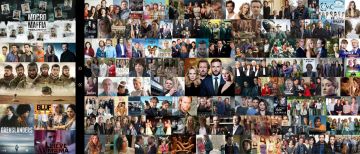
Of course, there are tv series that we did not include in our research that may contradict our conclusions, at least we hope so! But our data show that series are mostly made with a white actor or actress. And why is this? What considerations precede this? Is it assumed that this appeals most to the Dutch audience?
There is not a single drama series in which actors or actresses of color and migrant background are the only protagonists. Or in which they form, for example, a mixed duo who have a leading role together. As, for example, in Flikken Maastricht, Bureau Raampoort, Smeris or Moordvrouw? Series in which the so-called Good Guys are the white people who investigate and solve crimes. Why don't actors or actresses of color play the "Good Guys" or are they profiled as such in the publicity image? Would that have made the duo less credible? Why were only white actors chosen? What if a commissioner of color had been chosen for Detective van der Valk. It is a Dutch adaptation of a British series but the contract, I assume at least, does not state that the lead actor must be white?
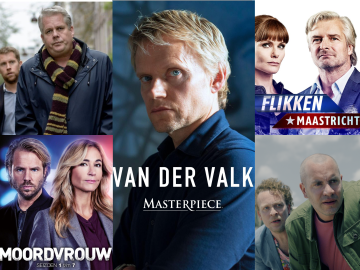
In the background of series featuring the so-called "Good Guys, actors or actresses of color and immigrant backgrounds do have a role but in the publicity image, a white actor is often more prominent. Sometimes there seem to be good reasons for the positioning of the picture. As with Flikken Rotterdam. Huub Stapel plays the Public Prosecutor but what would it have been like if an actor of color had had this role? Not that Huub Stapel would not play this role well but it is about role models that are provided in drama series.

Not everyone sees all the series, but one unconsciously relates to these white publicity images. This does something to your self-image. Seeing yourself reflected in media in important and positive ways is important for people's socialization process.
No more research is needed for that. For example, why isn't a series made about a doctor of color like, say, Doctor Tinus? Nothing against Thom Hoffman but what would it have been like if this had been a doctor of color?
Again, this is a Dutch adaptation of a British series but what would it have been like if an actor of color had played this role?
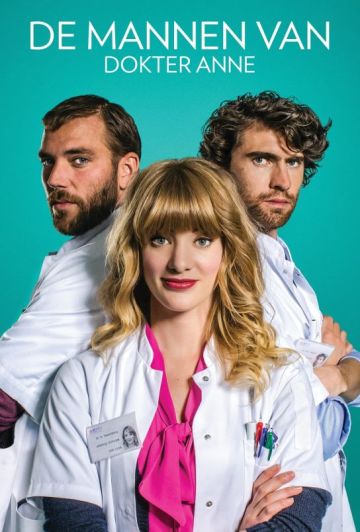
It's not about the actor in question but I'm so curious what arguments play into the choices? Why are there actually no leading roles with actors with a migrant background in medical series? Like, for example, in the Dutch adaptation of Doctor Anne. A German adaptation but surely there again there will not have been a color for the lead role? Or is there? To that answer I would be very curious! I understand that there are far fewer people of color and migrant background surgeons or specialized doctors but they are there. So why no people of color in Doctor Anne or Centraal Medisch Centrum?
The successful series Hendrik Groen is set in a nursing home in Amsterdam Noord for the elderly but there is no protagonist with a migrant background. Especially in Amsterdam Noord the population is much more diverse than in an old people's home in a rural village. Why is this not visible?
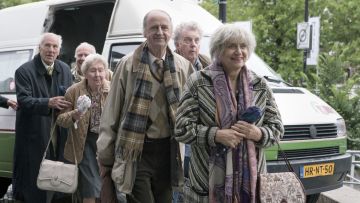
In the four seasons of New Neighbors, the protagonists remain white. Season one was based on author Saskia Noort's 2006 book of the same name. The storyline of season one is almost identical to the book. As of season two, the series has its own written storylines that can be seen as a sequel to the book. The screenplay was written by Dorien Goertzen, Philip Delmaar and Karin van der Meer. One could imagine that new neighbors of color are also coming to live there. Especially in the Randstad, this is the rule rather than the exception.
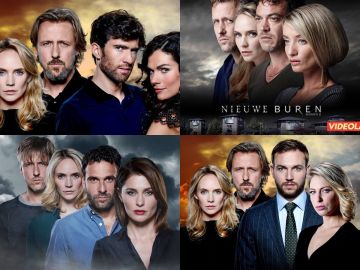
The series Divorce is about three divorced, single, white men who share a villa. The series, set in Haarlem, was conceived and developed by Linda de Mol as the unofficial male counterpart to Gooische Vrouwen. Screenplay is by Haye van der Heyden and Jacqueline Epskamp. What strikes us is that scenarios for Dutch series are mostly written by white screenwriters. Could this be the reason why people of color are underrepresented in the scripts they write? And thus also in the supply of Dutch drama series?
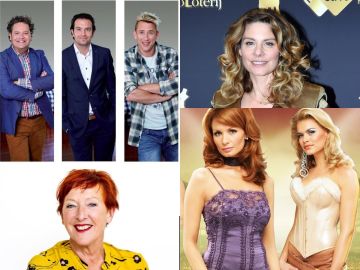
In Voetbalvrouwen, for example, the four female protagonists are white. Soccer Wives is a Dutch drama-comedy series conceived by a white woman, Ingrid van de Heuvel, and a white man, Johan Nijenhuis. On the soccer field, there are relatively many players of color anyway, and you might expect that to be reflected in the four leading roles for soccer women.
Broadcaster MAX will start a new drama series in 2021: Maud and Babs. The series will be shown on NPO1. The scripts are written by Patty Stenger and directed by Barbara Bredero. Without detracting from who they are or their qualities; They are both white. The lead actors are also white. The series is based on an existing story from Libelle magazine. But would it have been negotiable to give people of color leading roles?
We don't want to say that white people were deliberately chosen in the lead roles but the above is what we observe. And we wonder if there is awareness about this? And why this system is maintained for so long when the composition of society has long since changed so much? The creators of drama series, including writers, actors and actresses, are part of society and can't they see that the series are not a reflection of the entire Dutch society? Look again at the image below. Which is pretty much completely white.
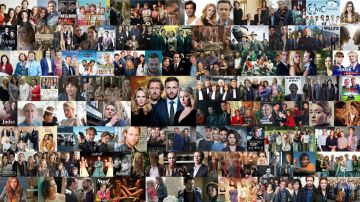
While all the missions of broadcasters and commercial stations say something else.
For example, the NPO writes:
"In our offerings we let the many voices and many colors of Dutch society be seen and heard. A society where there is room for everyone and where people feel connected despite their differences. For all these people we make recognizable programs'.

or RTL writes:
'It is our mission to make programs that touch your head and heart. It does not matter what your background is, what views you have or how you identify yourself. RTL is there for everyone in the Netherlands.'

TALPA, also an important producer for drama series, states:
'We tell the stories of the Netherlands, everywhere, all day long.'
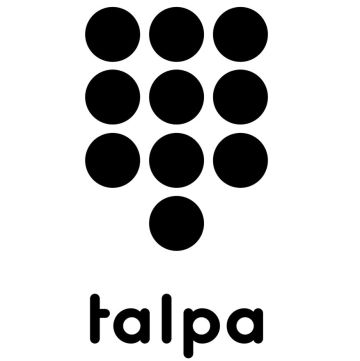
Drama as a reflection of Society
Again, we realize that our list of examined drama series is surely not complete. There are also drama series that deal with a chapter of Dutch history that leave casting agencies no choice but to suggest white actors and actresses. Drama series about Dutch politics in our history show that it was and is also extremely white in that world.
Drama series should be a good reflection of our society. These series should present viewers with storylines in which they recognize themselves. But that reflection does not seem to be correct. Because a large part of our society, in which one in four Dutch people has a migrant background and in the four big cities even the majority has a migrant background, is not represented that way. And is not visible in that way.
Why would young people of color and migrant backgrounds watch Dutch television? If they don't see themselves? And don't see the world as you see it around you every day?
What kind of image do drama series convey to Dutch society and youth? Are they able to make the difference and look critically? No in my opinion not. Actors or actresses of color and migrant backgrounds are often only visible in the image of stereotypes. Mostly conceived and written by white screenwriters? To which we do not say that this is done intentionally but the result is an under-representation of black actors or actresses as well as screenwriters and directors. If they are not at the writing table then it becomes difficult to get the right representation. Because according to the screenwriters with a migrant background that I talk to about this, screenwriters and directors with a migrant background are also severely underrepresented. And if they don't have a decisive voice in whether or not drama series are put into production, then the system will remain as it is. The law is simply if you don't change anything, you get the same thing.
How does this come about?
Media Luna wants to make a documentary exploring this phenomenon. Where in the chain of drama series productions does this start? With the courses? Are there far fewer students of color and therefore migrant backgrounds? Why aren't there many more proposals for a drama series where our society of color is represented by the cast? Do these proposals exist? How are production houses dealing with this? Who determines the stories? Who determines the backgrounds and environments in which these stories are set? Who chooses the actors?
Can an actor or actress of color play any role that a white actor or actress can also play? My answer is Yes. And yet why aren't they given the role of a divorced man, a soccer player, a police officer, a prosecutor, a doctor, a lawyer, a writer, etc?
Are the broadcasters even asking for them? How is this observation seen and experienced by actors or actresses of color and therefore immigrant backgrounds?
And how is this perceived by fellow white actors or actresses?
At production houses some time back, Media Luna has experienced an underrepresentation of editors, final editors, reporters and producers of people of color. The owner of Media Luna is herself of color; she has a Moluccan father and spent her childhood in Moluccan neighborhoods. It was through Club Veronica that she entered the media. A few years ago, she started the Media Luna Youth Council in which young people from diverse backgrounds give their opinions on what is offered in the media. They also advise Media Luna productions on the proper representation of young people or proper representation of inclusivity and diversity in various media productions. Click here for more information.
In addition, Media Luna is establishing The Colourful Media Academy. An exclusive Media Training for young people from migrant backgrounds. Click here for more information.
Media Luna aims to produce an engaging and contemporary documentary on the distribution of color in drama series. A documentary that brings to the surface the system that visibly and invisibly causes this distribution. If properly portrayed how this came about, perhaps we can change this. In any case, I cannot imagine that we want to maintain the current situation. I strive for a better balance, a division that does much more justice to who we are in the Netherlands.
Anousha Nzume says it so beautifully in her last sentences of the preface to her book 'Hello White People': 'I want to dedicate this book to all children in the Netherlands. Be Free. Stand in your light. Holland is yours'.
I almost completely agree with that and I would write: 'Holland is yours too'.
Contact
If you would like to comment on this article, already have answers or thoughts to share on why you think it is so? Then be sure to get in touch using the form below.
